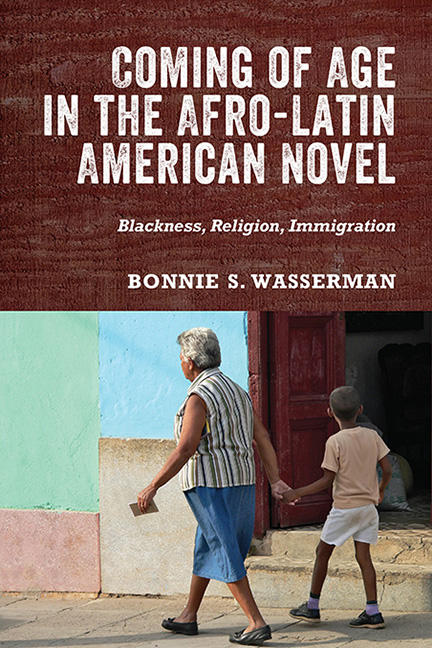Book contents
- Frontmatter
- Contents
- Introduction
- 1 The Intergenerational Bildungsroman in Daughters of the Stone and Ponciá Vicencio
- 2 The Epistolary Afro-Cuban Bildungsroman
- 3 Boys to Men: Masculinity in The Brief Wondrous Life of Oscar Wao and City of God
- 4 Reinventing the Afro-Latin American Bildungsroman
- Conclusion
- Bibliography
- Index
4 - Reinventing the Afro-Latin American Bildungsroman
Published online by Cambridge University Press: 16 July 2022
- Frontmatter
- Contents
- Introduction
- 1 The Intergenerational Bildungsroman in Daughters of the Stone and Ponciá Vicencio
- 2 The Epistolary Afro-Cuban Bildungsroman
- 3 Boys to Men: Masculinity in The Brief Wondrous Life of Oscar Wao and City of God
- 4 Reinventing the Afro-Latin American Bildungsroman
- Conclusion
- Bibliography
- Index
Summary
With the help of the expensive space-age medication “Rainbow Bright” and the tentacles of an anemone placed on her head, the main character of La mucama de Omicunlé, Acilde, rapidly transforms into a man. Her chest flattens out, her genitalia become male, and her jaw becomes sharp. This transformation takes place as Afro-Latin American prayers are said by the Cuban doctor Eric. While Acilde's alteration was long fated to help save the ocean, as a man he kills off the various avatars of himself. La mucama de Omicunlé and Sirena Selena, another coming-of-age novel that features an androgynous character who transforms him/herself, reflect a new era of twenty-first-century queer fiction that probes issues related to the Caribbean such as climate change and immigration.
In the final chapter of this study, we examine how contemporary authors queer the Afro-Latin American bildungsroman. Sirena Selena by Mayra Santos-Febres and La mucama de Omicunlé by Rita Indiana feature androgynous protagonists, cross dressing, and gender reassignment. As in other chapters in this study, these novels address themes of Blackness, religion, and immigration, although in unique narrative styles. A brief overview of queer theory is necessary for the analysis of Sirena Selena and La mucama de Omicunlé. In addition to its history of being a slur meant to demean homosexuals, the term “queer” is also used to mean “odd” or “strange.” Queer theory developed a decade after the initial devastation of the AIDS epidemic of the 1980s. According to cultural historian Tasmin Spargo, “Queer theory is not a singular or systematic conceptual or methodological framework, but a collection of intellectual engagements with the relations between sex, gender and sexual desire.” A number of theorists influenced the development of queer theory, including French philosopher Michel Foucault, gender theorist and Cal-Berkeley professor Judith Butler, Teresa de Laurentis, and Eve Sedgwick, among others. Foucault, author of The History of Sexuality, vol. 1 (1978), studied power systems in society and believed that sexuality was not based on biology but rather impacted by “historical, social and cultural” foundations. Moreover, Foucault shied away from strict definitions of “homosexual” and “heterosexual,” instead believing that there was a continuum of sexualities based on desire.
- Type
- Chapter
- Information
- Coming of Age in the Afro-Latin American NovelBlackness, Religion, Immigration, pp. 119 - 145Publisher: Boydell & BrewerPrint publication year: 2022



